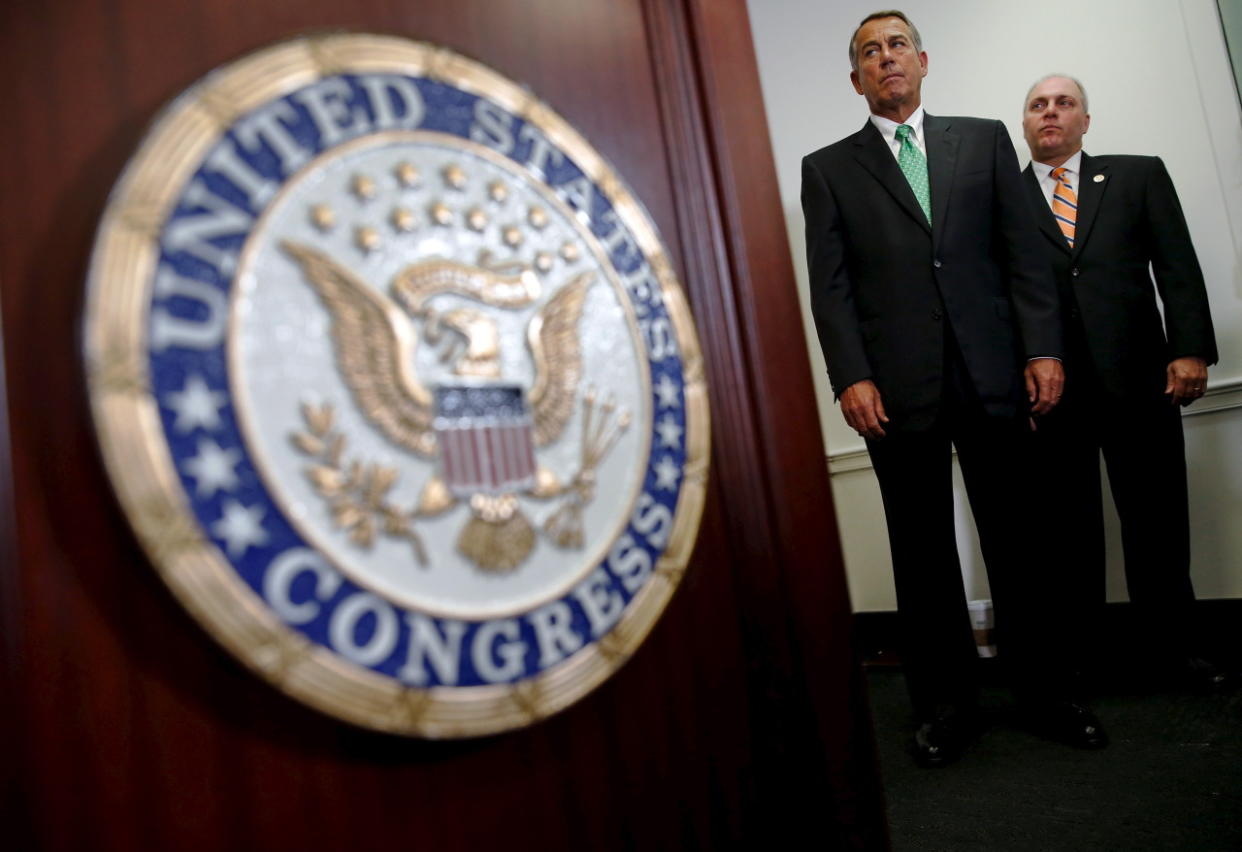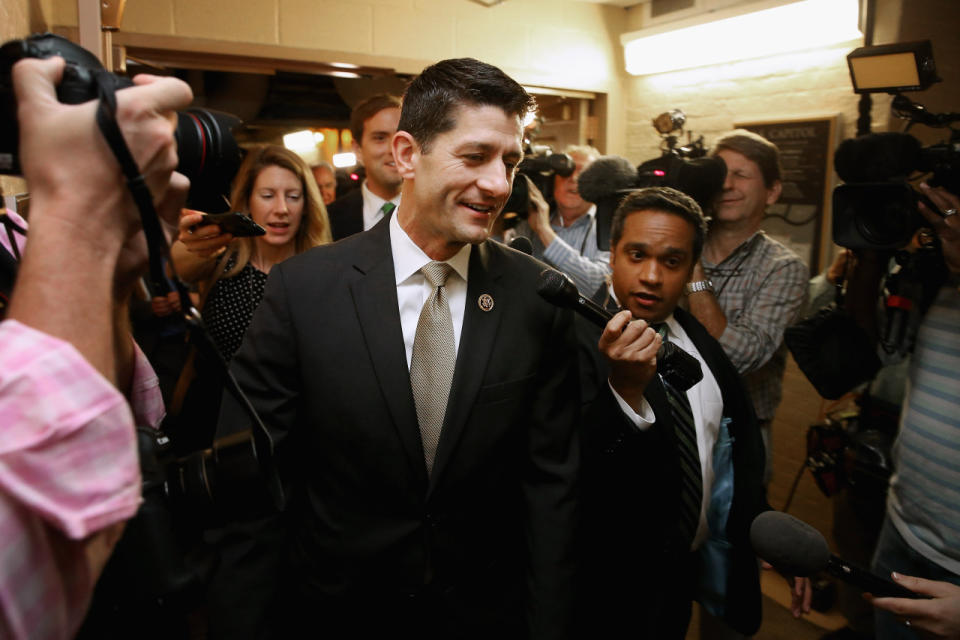For House Republicans, a crucial week

Speaker John Boehner hopes to exit Congress by week’s end, but several key outstanding issues for Republicans are standing in his way. (Photo: Jonathan Ernst/Reuters)
As John Boehner’s tumultuous years as House speaker come to a close this week — or so he devoutly hopes — his final fights may determine the fate of his presumed successor, Paul Ryan, who already is bracing for ideological attacks from the hardline members whose support for him is tentative at best.
The full House Republican conference was scheduled to meet Monday night to discuss a looming debt limit deadline and a potential two-year resolution to the fiscal questions that dogged most of Boehner’s tenure. They could meet again Tuesday morning to discuss those same issues.
A full House vote on who will succeed Boehner is scheduled for Thursday, the day after Republicans decide behind closed doors whom they will line up behind. And if all goes according to plan — and that’s still a significant “if” — Boehner will leave Congress on Friday and be replaced as speaker by Rep. Paul Ryan of Wisconsin, who has never held an official role on the House GOP leadership team.
When Boehner leaves the Capitol for the final time, it will mark an end to a complicated, fraught chapter for House Republicans — a chapter that began in 2010 when they regained the majority and was marked by stalemates, deadline crises and a 16-day government shutdown in 2013, and is ending with the largest GOP majority since Harry Truman was in the White House. The climax came this month with Boehner’s surprise resignation and an even more stunning move from his second in command, Kevin McCarthy, who bowed out of the running to be speaker even before his party’s conference got to vote on him. The next chapter is still full of blank spaces and question marks about whether the badly fractured House Republican conference will learn from its recent history.
Boehner had discussed wanting to “clean the barn” for his successor, even before Ryan reluctantly bowed to pressure to run for the post, but the Treasury Department made that job much more complicated when it pushed up the deadline for Congress to act on re-upping the government’s borrowing authority. As Ryan was trying to decide whether he would seek the leadership post — or perhaps, more accurately, grappling with the fact that the uncertainty created by his colleagues changed the course of his career no matter what — Boehner and his aides were privately working toward a solution to the debt-limit problem.
Republican leadership aides know and readily acknowledge that if they push forward with any sort of legislation to extend the debt ceiling, whether it’s a clean extension or part of a larger fiscal package that Congressional leaders are currently negotiating with the White House, they will need to do so on the backs of Democrats whose votes they will need.
Of course, it was exactly that kind of vote, to fund the government or raise the debt limit, for which Boehner relied on Democrats to avert major fiscal catastrophe and for which the hard-right conservatives in his party castigated him. His agreeing to work with Democrats and Senate Republicans to keep the basic functions of the government operational was the main reason tea party Republicans tried to use floor procedures to oust him. And for his part, Ryan has tried to assure hard-line conservatives in his party that he will not push legislation without the majority support of his conference, an edict referred to colloquially in Washington as the “Hastert Rule” after the speaker who first implemented the approach.
The budget and debt-ceiling votes make a fitting backdrop to the leadership vote, because the significant ideological differences within the House GOP conference are not going to disappear just because Boehner is leaving Congress.
The most conservative members of the House are wary of Ryan’s previous willingness to consent to pragmatic budget compromises, notably a deal he made with Democratic Sen. Patty Murray of Washington in 2013 to set budget spending levels for two years and take the threat of government shutdowns off the table. The White House, Boehner and respective congressional leaders are now seeking a similar two-year framework, which would help Ryan avoid these fights at the outset of his tenure and take the issues off the table for the 2016 presidential campaign.

Ryan says he has enough unified support to run for speaker, but whether those members stick with him, if and when he is elected to lead the House, is one of the biggest questions facing the Republican Party. (Photo: Chip Somodevilla/Getty Images)
Even if Boehner succeeds in giving Ryan, long one of his favorite members, a parting gift on his way to his first post-speakership round of golf, Ryan’s battle to unite the party is just beginning.
His meetings with major caucuses within the Republican conference hint at where the fault lines might lie, but one disagreement on process with the House Freedom Caucus, the 40-or-so-member block that sank Boehner and McCarthy, is especially revealing.
Ryan has told members he wants to fundamentally alter the procedure for a “motion to vacate the chair,” the procedural ax that conservatives held over Boehner’s head in their repeated attempts to vote to remove him.
For their part, according to multiple sources, House Freedom Caucus members are pushing for process changes that would lay the foundation for a takeover of House operations. They want to change the powerful 31-member steering committee so that they have as many seats at the table — five — as the speaker. The steering committee assigns members to standing committees and selects chairmen. The speaker has five votes, the majority leader has two and then a variety of members based on committee and region have one each. By getting a much larger share of the body, House Freedom Caucus members could stack committees they cared about with their conservative allies. They then want the chairs chosen by vote of the committee members, rather than appointed by the steering committee, putting their allies in place at the head of the most powerful committees.
Agreeing to this would doom any speaker from the start, and it was something McCarthy wasn’t willing to do, which was one reason the Freedom Caucus formally endorsed Florida Republican Daniel Webster instead.
Ryan has said he is open to considering rules changes as a full conference after he takes his gavel, and these in-the-weeds but important conversations are sure to be an opening fight of his speakership. It’s unclear that members who lean toward the anti-government end of the conservative spectrum even want to be part of a functional governing majority, and that’s a reality Ryan faces even before he accepts their votes this week.
For better or worse, Democrats seem excited about the prospects of Speaker Ryan. Vice President Joe Biden, who has been President Obama’s emissary in some of the biggest fiscal fights of his administration, pointed to Ryan’s candidacy for speaker as a reason why he believes Obama’s last 18 months can be fruitful ones.
“I think we can get a number of things done. … I think we can make some real progress, particularly with Paul Ryan, who is a good guy, on working toward an accommodation on the budget and on keeping the government open,” Biden told CBS News’ “60 Minutes” Sunday. “This is a decent guy. And he knows you cannot function — this government can’t function — without reaching some consensus, and he wants to do that.”
Boehner wanted to do that too, it was just that so many of his fellow Republicans wouldn’t follow him. Perhaps Ryan will have a different fate.

